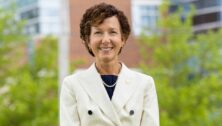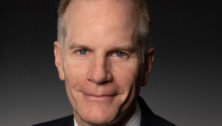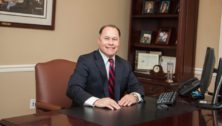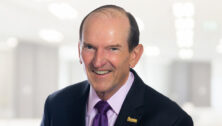Bucks County Leadership: Margaret Harkins, Dean of Nursing, Holy Family University
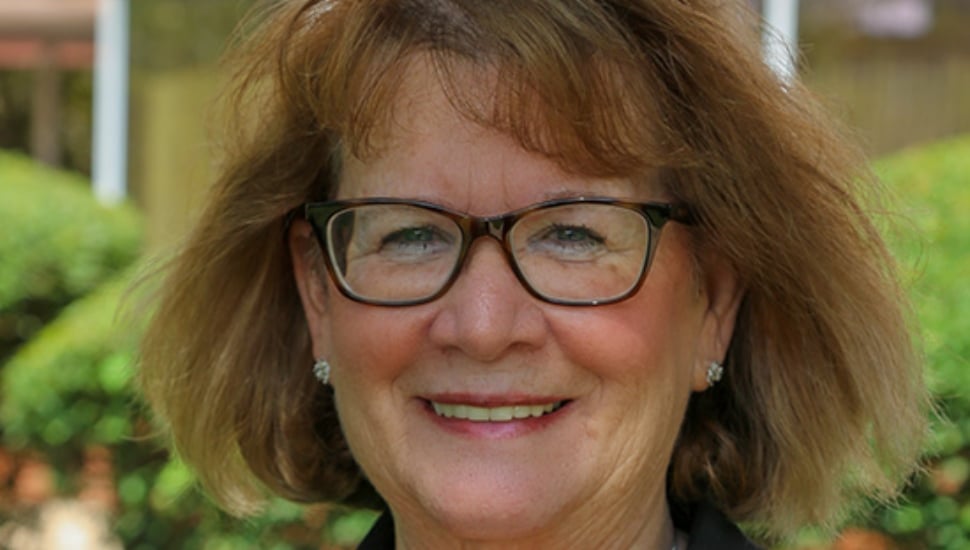
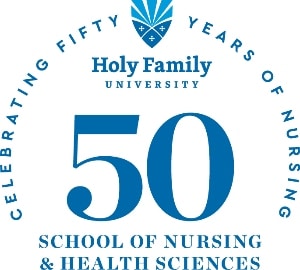
Margaret Harkins, DNP, MBE, MSN, GNP-BC, RN-BC, dean of nursing at Holy Family University, grew up in Philadelphia as the daughter of Scottish immigrants. She recalled the tight-knit neighborhood of Olney and working on evenings and weekends as a teenager to earn spending money.
In her early 20s, Harkins had a son who was born with a disability. After spending years in and out of the hospital with him, she decided to go to school and earn her nursing degree so she could better understand the medical field.
Today, she’s helping Holy Family expand its nurse practitioner programs and getting more students interested in nursing after the profession took a hit during COVID.
Where were you born and where did you grow up?
I was born the third of four children in the Olney section of Philadelphia.
My parents were immigrants. They came over from Scotland to Canada and then to the United States in 1953. My mom was a homemaker, and then she got a part-time job at Sears on Roosevelt Boulevard as we got older. My dad was a bricklayer.
What memories do you have of growing up in Olney?
Olney was a very tight community when I was growing up. We lived in row homes and our parents – our moms, primarily – would sit out back. There was a group of them who would get together and all the kids would play out back.
Did you play any sports in high school?
I played basketball – I don’t know if it was in high school or grade school, but I remember finally getting in to play. I ran across the court at Saint Ambrose and I jumped on a girl’s back to get the ball. And for some reason, they didn’t put me in the game anymore! Athletics was not my thing.
So, what did you do to distinguish yourself in high school?
I worked a lot. After school, I worked at the local cleaners, and I worked at a country club as a waitress on the weekends. Our parents didn’t have a lot of money, so if we wanted something, we had to go out and work for it. So, I never really got involved in anything in high school.
My soulmate was my boyfriend back in high school. After my husband died and my son died, we got together again. We’ve been together for 17 years.
What did you do after high school?
I got married when I was 21. I had my son when I was 23. During my time at Cardinal Dougherty High School, I learned typing and shorthand. I wanted to go to college and be a radiologic technician, and my father said, “No way,” because it was too dangerous – so, I took a job in Center City at Colonial Penn Insurance as a transcriber and typist.
I worked there until I had my son, and then I had to quit. He was born with a subarachnoid hemorrhage, which is basically a brain bleed. He didn’t walk or talk. We spent a lot of time in and out of the hospital with him, and I had no clue what anybody was talking about. I said, “I need to go to school to learn more about this.” I always had an interest in nursing. I always loved medical books and reading about different diseases.
I went to Community College of Philadelphia and took the prerequisites, and it took me seven years to get my associate degree. At that time, my son was in and out of the hospital. He would become dehydrated, get ear infections, wouldn’t drink his bottle, and wouldn’t eat, because he couldn’t do anything for himself, so everything was dependent on us.
I got my nursing degree in 1991, and then my daughter was born, and she was perfectly healthy.
What caused you to dive deep into the academics?
I’m Scottish – and I’m a bit bullheaded. A lot of the things that people would say to me in the hospital – my son was very small when he was born, and he never gained a lot of weight. When he died, he was 40 pounds. When I would go into the hospital, people just didn’t know how to act. Nurses didn’t know what to say, they didn’t know how to behave, their body language told a lot. I thought, “I need to change this culture of what these nurses are thinking and showing in their body language when it comes to people with disabilities, people who are not ‘normal.’”
And I knew my husband was sick. He got bit by a dog – he was a mailman – and the virus went right to his heart. He lived 10 years with a diseased heart. But I knew that he wasn’t going to live long. So, I knew that I was going to have to take care of these two kids – and I was seeking quality of life for my family. We had moved to Lawndale, which was up the street from Olney, but I needed a better school district for my son because of his disability. And I had such an interest in nursing. When people would say, “Why don’t you read a good book?” I’d say, “There are no good books except nursing books.”
Where does your work ethic come from, Margaret?
My work ethic comes from my parents. They were immigrants – they never had anything. I remember my dad would put $80 on the kitchen table every week, and that was what my mom had to buy our food with. So, God forbid if I wanted to go to American Pants Company down on
Frankford Avenue and buy a $10 pair of jeans. It wasn’t happening. My dad was always working as a bricklayer and would come home exhausted, and my mom had four of us to take care of, including twins. I watched how hard they worked to make ends meet and I often said to myself, “There’s got to be a better way.”
What kind of music you were listening to growing up?
Billy Joel was a big one. And I still listen to Anne Murray and Kenny Rogers – love songs and music like that. I still have those CDs in my car.
Looking back over your career, if you could do anything differently, what would you do differently?
If I would have been able to start nursing school right out of high school, I think that would have been a tremendous help, because I would have had a career before I got married. I was a secretary – basically, a typist. You know how much money they make. I don’t fault my parents for that, but they weren’t college-educated. They weren’t the kind of parents who were going to say, “You’re going to college.” As a matter of fact, my brother got a scholarship to Widener after he got out of Community College of Philadelphia, and my father would not allow him to go.
Looking back on your career, who were the people who saw promise in you?
I credit a woman I worked for who allowed me, while attending Community College of Philadelphia, to work on the weekends, whatever hours I wanted, and in the evening, whatever hours I wanted, and do the typing that they needed to have done based on my schedule. And then I could use the office, because it was off-hours, to study.
I would go there on the weekends, especially when I was taking nursing courses. My husband would be home watching our son, and I would be studying 12 hours a day, all day Saturday and Sunday. I would get my work done that I had to get done for them, and then I would focus on studying for nursing.
This director, who was a mentor to me, gave me the opportunity to think beyond who I was. She was a graduate of the University of Pennsylvania. I said, “Oh, I would love to go to University of Pennsylvania.” And she said, “Well, you can do that.” She and the co-director sat me down and advised me on the trajectory I should take. I guess they saw in me a determination to succeed, despite any challenges that I was going to have.
Who else saw promise in you across your career?
My nurse managers saw my potential. I used to work at Einstein. I was on the floor, and I would be the charge nurse. Rose, the nurse manager, told me I had a supervisory talent. She said, “People might not like being told what to do, but you’re not afraid to say something or advocate for something that you believe in.”
People don’t like to be told what to do, but they love to be led. We all like to be led by strong leaders.
I’m not sure if you’re familiar with the culture of nursing, but nurses are a unique group of individuals. We’re a tough group. I think a lot of it comes from what we see and what we deal with. We enter one room and someone’s dying, then we enter another room and family members are celebrating a birthday. You have to be able to manage your emotions and your emotional intelligence to be able to handle all of that.
So, how did you end up at Holy Family?
I worked at La Salle for a year, then I got an offer at Drexel University, and I felt like there was more potential for me to grow there. And I did grow. For 12 years, I taught gerontology, and I was also a nurse practitioner.
But the commute was taking its toll on me. I was living in Richboro at the time, and it was a three-and-a-half to four-hour commute every day on I-95.
I decided to work adjunct, and Holy Family needed someone to teach the summer that I resigned from Drexel. Then they brought me on full-time and took me up to the Newtown campus and asked me if I would be the program coordinator for the accelerated program. Then, I became an assistant dean and an associate dean and then an interim dean. Then, the previous dean retired, and I was named dean.
Here we are at the start of 2024. What are you focused on and what are your priorities for the new year?
My priority is to get people interested in nursing. Nursing as a whole took a hit during COVID. The profession itself were not treated as well as it could have been treated. I think that took a real toll on the upcoming nurses and whether or not they would choose nursing as a career.
So, my job right now is to try to reinvent the nursing profession by getting young people more interested in it and sharing the many positives about a career in nursing. I often say to students, “If you don’t want to do bedside nursing, that’s fine. I get it. Just get through nursing school, and you can help people in so many different ways.” You don’t have to be in a hospital to do that.
My focus right now is to reinvigorate the nursing profession and to grow the nursing programs here at Holy Family University. We’re working on growing a psychiatric nurse practitioner program, a certified nurse’s aide program, and a family nurse practitioner program that stands alone. That’s where healthcare is going. Whether the medical field wants to admit it or not, healthcare is going to be heavily staffed by with providers who are nurse practitioners.
What are you doing to breathe new life and reinvent nursing to get more students in your program?
We will be going out to high schools – including the Catholic boys’ schools, because I don’t think boys understand the tremendous value they can bring to the nursing profession. As we celebrate 50 years of nursing excellence, our goal for this year is to share our tremendous programs and the wonderful careers that the next generation can have. And our reputation precedes us.
I can’t tell you how many healthcare providers have said to my staff and me, “If you graduate 100 nurses, we will take them all!” Our nurses play such a critical role in healthcare throughout the Philadelphia region – and the Holy Family name assures healthcare providers that they are recruiting nurses from a first-rate nursing program.
We will also be focused on nurses who are already practicing to ensure that they continue to advance their careers with advanced degrees. Holy Family is ideally suited to educate not only tomorrow’s nurses, but tomorrow’s leaders in nursing.
Margaret, over the last 10 years, what is something that you’ve changed your mind about?
It’s great that you mention that. It’s not that my mind has been changed but that finally, the world has changed to become more inclusive. I recently gave a lecture on LGBTQIA and underrepresented populations.
Today, everyone has a seat at the table. That includes people with disabilities and veterans. The nursing profession needs to hear all voices and must be represented in inclusive ways so that all patients see themselves as their nursing professionals. And this aligns well with the mission and core values of Holy Family University.
It’s a crazy world out there, and nurses see a lot. What keeps you hopeful and optimistic?
I see the product that we are producing at Holy Family. I see the ethics of the younger population. Today’s students are much more vocal and not afraid to stand up for their beliefs. The nursing profession needs this, and society needs this – so, I have a lot of hope for this world.
Finally, Margaret, what’s the best advice you ever received?
My mom always said, “You can do anything you put your mind to.” And she knew me well. That advice got me where I am today. It gave me the drive to say, “Keep going.” And she was so proud of me. Any time we were out she would make a point of saying, “My daughter is an R.N.” That to me is one of the most meaningful validations of my professional career.
Connect With Your Community
Subscribe for stories that matter!
"*" indicates required fields


























